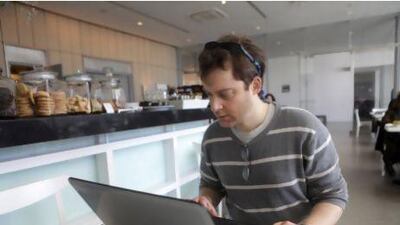JERUSALEM // When Ofer Neiman votes in Israel's parliamentary elections next week, he will not be deciding on the party of his choice. Instead, Mr Neiman, an Israeli, will cast his ballot on behalf of a Palestinian that he has never met.
Mr Neiman is one of dozens of Israelis who have agreed to give voice to Palestinians living in east Jerusalem, the West Bank and the Gaza Strip, whose future is being shaped by a political system in which they have no say and few influential allies.
Disillusioned by the inability of mainstream Israeli parties and politicians to end the occupation of the Palestinian Territories, home to about four million people, they have turned to social media to make their views known.
"We're saying that these elections are not democratic because millions of people who are affected by Israeli policies can't participate," said Mr Neiman, 42, a Jerusalem resident and activist who works as an English translator. "We're saying these elections are non-democratic and, hence, illegitimate."
On a Facebook page created last month called Real Democracy, Israelis offer Palestinians the chance to choose a party in the parliamentary elections on Tuesday. A Palestinian responds to an offer by posting on the page instructions for the Israeli to either cast a ballot for a party or boycott the poll altogether.
Real Democracy offers Facebook users a chance to demand that either Israel must end the occupation and support an independent Palestinian state living side-by-side with it, or offer those Palestinians Israeli-voting rights. The Facebook page has already received 1,300 "likes".
Participating members, however, generally refrain from advocating issues such as the two-state solution. Mostly, it is about highlighting what they consider a major contradiction of Israel's political system.
"On a basic level, there are no political parties that represent my positions," said Aya Shoshan, a 28-year-old Israeli and Tel Aviv resident who works at a company providing energy to West Bank Palestinians who are denied electricity by Israel.
"On a deeper level, there is a structural problem even if there was a party that represented me, because there are four million civilians practically living under Israeli rule and who have no right to vote."
She offered up her vote to a Palestinian on the Facebook page on January 5.
While some Israeli candidates have brought up the occupation during the election campaign, they have focused on what they describe as the "demographic threat" to the country's Jewish majority if Israel continues to rule over so many Palestinians.
Most of these candidates are centrists critical of the country's right-wing government, led by prime minister Benjamin Netanyahu. He is expected to be re-elected, heading a coalition that favours Jewish settlements on Palestinian land, hardline positions on the Palestinian-Israeli peace process and, by extension, the occupation.
Yaron Ezrahi, professor of political science at the Hebrew University of Jerusalem, criticised politicians for hardly mentioning together "the words 'occupation' and 'peace'" during this election campaign.
Although a marginal group further left than the Israeli mainstream, Real Democracy, should be lauded because it "highlights the main issue - that this election is not democratic", Mr Ezrahi said.
Israelis, he added, "are sitting on a huge, coerced population that has no right to vote".
Real Democracy was founded not only to protest against the occupation. Its primarily left-leaning members also want to highlight what they consider the undemocratic nature of the United Nations and Israel's influence over one of its veto-bearing members in the Security Council, the United States.
Washington overwhelming supports Israeli positions in the world body, including opposition to the Palestinian upgrade last year to non-member-observer state in the General Assembly.
An Israeli woman, Shahaf Weisbein, however, seemed primarily concerned with Palestinian voting rights in the context of next week's elections. She offered to give her vote away on the Facebook page on January 3. "This is not a democracy, it is an apartheid regime," she posted on the Real Democracy page.
A 33-year-old Palestinian man from the West Bank, Mousa Maria, responded to Ms Weisbein online, telling her to vote for Israeli-Arab party, Balad.
Bassam Aramin, a 44-year-old Palestinian from east Jerusalem who participates in non-violent demonstrations against the occupation, responded to Mr Neiman's offer to give away his vote. Mr Aramin has instructed him to vote for Hadash, a socialist Jewish-Arab party.
"The idea is moral and it's a courageous one," he said of Mr Neiman and the Real Democracy campaign.
"The Israelis must be responsible for their occupation because it's in their name, and what they [Real Democracy's Israelis] have said is, 'No, it's not in our name'."
hnaylor@thenational.ae
twitter: For breaking news from the Gulf, the Middle East and around the globe follow The National World. Follow us

